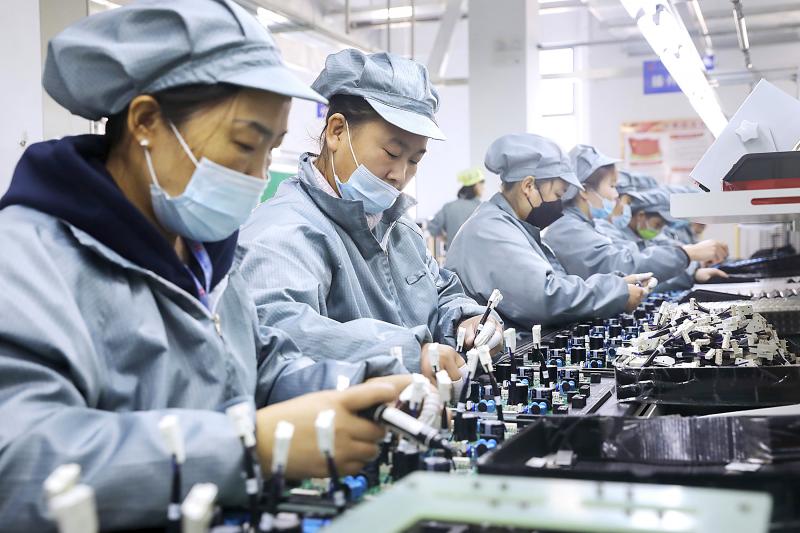A former Chinese finance minister criticized the country’s statistics for not properly reporting negative economic changes, with the rare harsh public statement from a senior figure highlighting long-standing concerns about the accuracy and reliability of national data.
A key meeting of top leaders last week said China’s growth next year would be weighed down by a “triple” whammy of contracting demand, a supply shock and weakening expectations.
However, none of those are visible in the statistical indicators, which have all been “very good,” Lou Jiwei (樓繼偉), a former Chinese minister of finance, said at an online event on Saturday.

Photo: AP
“There are insufficient figures reflecting negative changes” in the economy, Lou said, adding that the one-sided data make it harder to assess the government’s current judgment on the “triple forces” overshadowing the economy.
“In contrast, the US has both positive and negative numbers,” he said.
While the Chinese government touts the increase in the number of companies and other market entities, despite the COVID-19 pandemic, it has not publicized that a large number of these are inactive due to business woes and the difficulty of canceling official registrations, Lou said.
Similarly, government statistics count new jobs created, but do not follow up on whether those people are then laid off after six months or more, he said.
Lou is well-known as an outspoken and forthright commentator on the economy. After serving as finance minister, he headed the national pension fund until 2019.
Economists, as well as Chinese government officials, have repeatedly raised questions about the accuracy of the nation’s economic data over the years. After a series of scandals about faked data, a special unit was set up to combat the issue, with Chinese National Bureau of Statistics Director Ning Jizhe (寧吉喆) saying in 2018 the problems were all in the past.
Ning spoke at the online forum on Saturday just before Lou made his comments.
Although China’s statistics do look to have improved in recent years as national authorities take over more responsibility for data collection, doubts remain, with issues such as the steadiness of growth statistics or discrepancies between national and local numbers continuing to raise questions about accuracy.
The most important word for Chinese economic policy next year is “stability,” according to a senior economic official of the Chinese Communist Party (CCP).
There are many hidden risks in the economy and the financial sector, and China cannot return to the old growth path, Han Wenxiu (韓文秀), executive vice minister of the CCP’s Central Financial and Economic Affairs Commission, said in an online event on Saturday.
Han was explaining the economic plans for next year, which the CCP released on Friday.
The property sector is large, has a long supply chain, and accounts for a high proportion of the economy, fixed-asset investment, local governments’ income and financial institutions’ loans, Han said.

South Korea’s equity benchmark yesterday crossed a new milestone just a month after surpassing the once-unthinkable 5,000 mark as surging global memory demand powers the country’s biggest chipmakers. The KOSPI advanced as much as 2.6 percent to a record 6,123, with Samsung Electronics Co and SK Hynix Inc each gaining more than 2 percent. With the benchmark now up 45 percent this year, South Korea’s stock market capitalization has also moved past France’s, following last month’s overtaking of Germany’s. Long overlooked by foreign funds, despite being undervalued, South Korean stocks have now emerged as clear winners in the global market. The so-called “artificial intelligence

Chinese artificial intelligence (AI) start-up DeepSeek’s (深度求索) latest AI model, set to be released as soon as next week, was trained on Nvidia Corp’s most advanced AI chip, the Blackwell, a senior official of US President Donald Trump’s administration said on Monday, in what could represent a violation of US export controls. The US believes DeepSeek will remove the technical indicators that might reveal its use of American AI chips, the official said, adding that the Blackwells are likely clustered at its data center in Inner Mongolia, an autonomous region of China. The person declined to say how the US government received

FORTUNES REVERSED: The new 15 percent levies left countries with a 10 percent tariff worse off and stripped away the advantage of those with a 15 percent rate In a swift reversal of fortunes, countries that had been hardest hit by US President Donald Trump’s tariffs have emerged as the biggest winners from the US Supreme Court’s decision to strike down his emergency levies. China, India and Brazil are among those now seeing lower tariff rates for shipments to the US after the court ruled Trump’s use of the International Emergency Economic Powers Act to impose duties was illegal. While Trump subsequently announced plans for a 15 percent global rate, Bloomberg Economics said that would mean an average effective tariff rate of about 12 percent — the lowest since

Standard Chartered Bank Taiwan’s newly appointed chief executive officer, Anthony Yu (游天立), yesterday unveiled an ambitious growth strategy for the bank’s wealth management division, reflecting a bullish outlook on Taiwan’s high-net-worth market. Yu, the first local executive to lead Standard Chartered Bank’s Taiwan operations, emphasized rising client demand and detailed plans to expand the bank’s digital capabilities, as well as its physical presence across the country. Standard Chartered Taiwan saw a remarkable surge in new wealth management clients last month, with the number of clients holding assets equivalent to US$1 million more than doubling compared with the same month last year, he